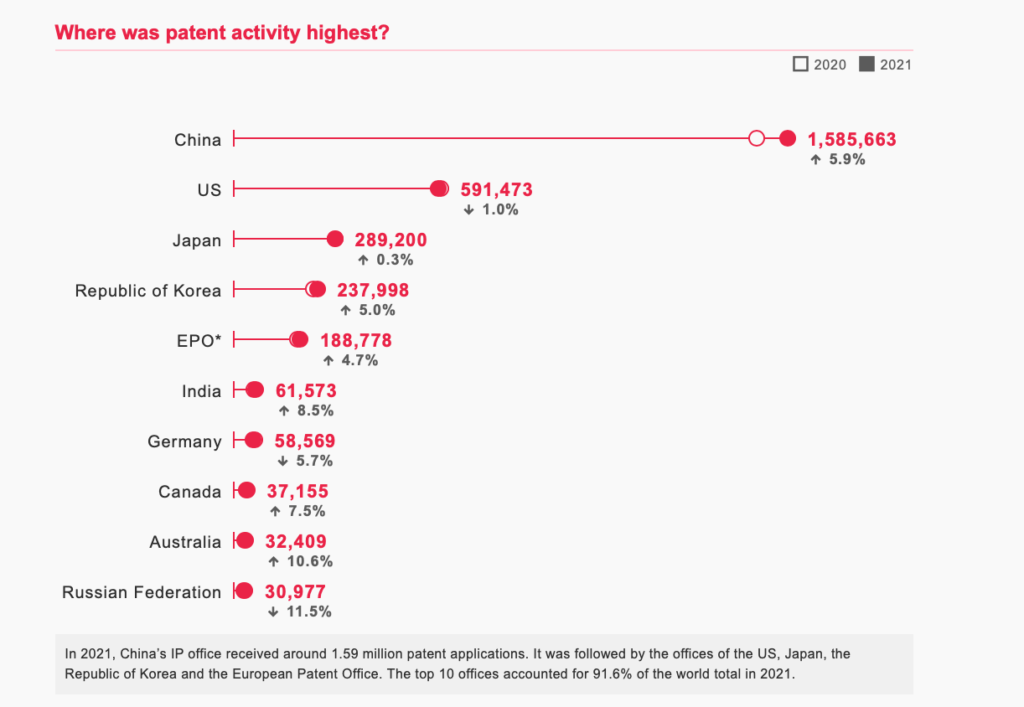Europe’s decline in one chart.
Look at Europe’s decline. EU has an innovation potential by addressing outsourcing, investment, salaries, and lobbying – a path driven by political decisions.

innovation business businessman 561388
In the ever-evolving landscape of global innovation, China and the United States have emerged as patent powerhouses, while Europe’s patent filings have lagged behind. This raises a critical question: why does Europe appear to be trailing in the race for innovation and patent creation? Let’s dive into the factors that shape this narrative.
Look at Europe’s decline in this chart , from the WIPO website (The World Intellectual Property Organization)

The EPO is the European Patent Office, and the amount of patents of 2020 and 2021 are way lower than China and US level.
The problem is that the chart, is the future of those countries. Those patents filing mean innovation and maybe some genius idea that will commercially take over the planet.
Why, then, has Europe, historically renowned for its inventive spirit and intellectual prowess, seen a decline in productivity in the field of innovation?
Government investment in research and innovation is a critical driver of patent filings. China, for instance, has channeled substantial resources into research and development, fueling its patent figures.
So the question is, why the EU has opted to take a step back and, for the most part, maintain its funding levels over the past decade ?

Source website.
Many will say that there is too much regulation, particularly regarding data privacy and competition, which can create challenges for tech companies. While these regulations protect consumers, they can also be a barrier to rapid growth. So why they keep the foreign giants make their laws in Europe and limit european companies ?
Big companies lobbies may seek to establish industry standards that favor their technologies or products, which can make it challenging for European companies to compete on a level playing field.
Also several American companies, supported by lobbies, gain easier access to European markets through trade agreements and negotiations, potentially affecting European businesses that face increased competition.
https://www.politico.eu/article/big-tech-companies-face-potential-eu-lobbying-ban/
https://www.ft.com/content/16816444-1694-4530-84bb-ac289d6776dd
While trials are underway and accusations are being made in Europe, it’s essential to recognize that the issues at hand are not solely the fault of foreign entities.
Europeans may stick to old industries as automotive or Pharma, letting all the AI, the blockchain and renewable innovation to other countries.
Europe’s decision to adopt a “service” economy, marked by extensive outsourcing of production and energy generation to foreign nations, is now rebounding as a double-edged sword. In the contemporary world, characterized by pressing climate challenges, the imperatives of independence, innovation, and adaptability have taken center stage like never before.
So let’s resume :
The decline in European innovation, can be attributed to several key factors such as outsourcing, insufficient research investments, diminished motivation due to comparatively lower salaries, and the influence of lobbying. While these factors are significant, it’s crucial to recognize that they are, in fact, rooted in political decisions.
Outsourcing, for instance, often occurs due to trade policies and international agreements that guide economic relationships. The decision to reduce or maintain research investments is inherently political, reflecting the priorities and budget allocations of governments. Similarly, salary levels and labor regulations are influenced by political decisions that shape economic and social policies.
Lobbying also operates within a political framework, as it seeks to influence policymakers and shape legislation in favor of specific interests.
However, the power to change these circumstances lies within Europe itself. European governments and institutions have the authority to revisit and amend these political decisions. They can make strategic choices to prioritize research and innovation, to reevaluate outsourcing practices, and to address the motivations and incentives for workers. In doing so, Europe can reshape its economic and technological landscape, fostering a more vibrant culture of innovation and competitiveness on the global stage. It’s a matter of political will and strategic planning to steer the region in a new direction.




